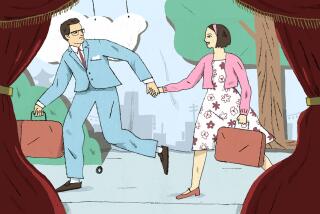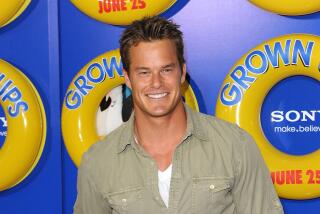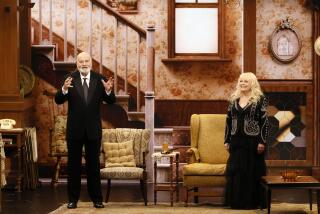Conrad Bain dies at 89; played father on ‘Diff’rent Strokes’
While portraying the white millionaire father on the hit TV sitcom “Diff’rent Strokes,” Conrad Bain was often asked whether he enjoyed working alongside such scene-stealing young co-stars as Gary Coleman, who precociously played one of his two adopted black sons.
A father of three in real life, Bain would invariably reply, “I love kids, I loved raising children” and only gently admit that perhaps some patience had been required.
At 49, he had been plucked from the New York stage by producer Norman Lear to play an uptight neighbor on the 1970s sitcom “Maude.” Broader fame came Bain’s way as Philip Drummond on “Diff’rent Strokes,” which aired from 1978 to 1986. The actor often served as a comic foil for Coleman’s wise-cracking Arnold.
“When you are a Conrad Bain, nobody is stealing the show,” Lear told The Times on Wednesday. “He had a very rare comedic spine. He could be a straight man, he could be the funny guy — very quietly. While the kids were out front, he lost nothing.”
Bain, 89, died Monday of natural causes in the Bay Area city of Livermore, his family said. He moved there in 2008 from Brentwood to be near family members.
A 1978 Times review of “Diff’rent Strokes” pointed out that Bain had spent six years feeding straight lines to Bea Arthur’s liberal Maude and “now he’s straight man to a 3-foot Milton Berle,” referring to Coleman, who was 10 when the show debuted.
When Bain was “discovered” by Lear, he had nearly two decades in New York theater behind him. In the mid-1950s, he had appeared in the original Broadway production of the Leonard Bernstein musical “Candide” and in Jose Quintero’s landmark off-Broadway revival of Eugene O’Neill’s “The Iceman Cometh.”
“I thought ‘The Iceman Cometh’ was a total bomb,” Bain said in a 1991 Times interview. “We opened on a Tuesday and I told my wife we could make a date for Friday. I guess I was too close to the forest to see the trees.”
When the interview veered toward the troubled lives of the three co-stars who had played his children on “Diff’rent Stokes — Coleman, Todd Bridges and Dana Plato — Bain was reluctant to discuss them. He called the subject “really painful” and added: “I love them.”
Coleman, who became a tabloid staple for his legal, financial and health woes, died at 42 in 2010 after a brain hemorrhage. Plato, who pleaded guilty to robbery and forgery charges in the early 1990s, was 34 when she died in 1999 of an apparent drug overdose.
Only Bridges, who played the other adopted black son, Willis, survives. He later said he had been sexually abused by a family friend and blamed it for causing a drug addiction. Last year, Bridges spoke out in support of California legislation to protect child actors from predators.
Although Bain had only been their fictional father, he later said he sometimes filled that role in real life, counseling them and reaching out to Coleman’s parents.
“They were in young, formative years in their lives” during the show, Bain told CNN in 2002, “and it’s painful to see the results of that.”
Conrad Stafford Bain and his twin brother, Bonar, were born Feb. 4, 1923, in Lethbridge, in the Canadian province of Alberta, to wholesale merchant Stafford Bain and his wife, Jean.
At the Banff School of Fine Arts, Bain met his future wife, Monica, an artist and fellow student whom he married in 1945.
After serving in the Canadian army during World War II, Bain moved to New York in 1949 and studied at the American Academy of Dramatic Arts.
Between 1956 and 1973, he appeared in two dozen Broadway and off-Broadway productions before coming to Hollywood to play conservative Dr. Arthur Harmon on “Maude.” In one episode, his twin played his brother.
Soon after “Diff’rent Strokes” ended, Bain debuted in 1987 as an affable chief of staff on the short-lived sitcom “Mr. President” — and then largely retired from television.
In the movies, he had small roles in about 20 films, including his last, as a befuddled grandpa in 1990’s “Postcards From the Edge.”
Later in life, he returned to what he called his first love, the theater. In 1991, he appeared in a Pasadena Playhouse production of A.R. Gurney’s “The Dining Room” and starred in a Broadway revival of the comedy “On Borrowed Time.”
“I really did see a lot of him in the television character of Philip Drummond,” his daughter said. “He was a very intellectual person, a broad thinker and a great father whose favorite role was being a parent.”
His wife died in 2009, and his twin brother died in 2005.
He is survived by his three children, Jennifer, Mark and Kent.
More to Read
Start your day right
Sign up for Essential California for the L.A. Times biggest news, features and recommendations in your inbox six days a week.
You may occasionally receive promotional content from the Los Angeles Times.




















































